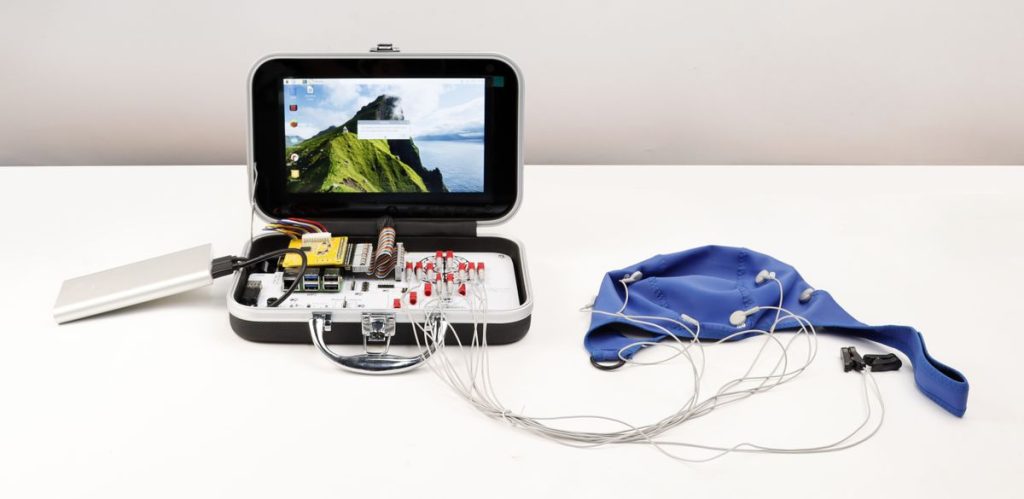Innovative input devices for computers extend beyond conventional keyboards and mice to include sensors that detect various physical signals, such as brain activity. The PiEEG project, led by Ildar Rakhmatulin, previously showcased in 2023, is evolving into the PiEEG Bio Lab—set to launch on IndieGoGo. This new kit will provide users with the tools needed to read and analyze both brain and body signals.
Key Components of the PiEEG Bio Lab
The centerpiece of the PiEEG Bio Lab is the PiEEG HAT, which has been enhanced and integrated into a portable briefcase-style setup. This kit encompasses a custom PCB and display, along with various sensors to monitor health metrics. The sensors facilitate the measurement of electrical brain activity through an electroencephalogram (EEG) and also include functionalities for electrooculogram (EOG), electrocardiogram (ECG), and electromyography (EMG).
Environmental Monitoring
The PCB is equipped with sensors for monitoring a range of environmental conditions, including oxygen saturation, temperature, sound, air quality, and humidity. This enables the collection of comprehensive data alongside physiological measurements, offering a multifaceted view of the user’s health and environment.
Robot Control Interface
In addition to its health-monitoring capabilities, the kit features a “Robot control” interface. Unlike a traditional motor controller, this interface facilitates communication between the kit and external devices, such as robotic arms. For example, users can control a servo-driven robotic arm by interpreting brain signals captured through the ECG sensors, translating mental impulses into physical movements.
Applications of the PiEEG Bio Lab
The applications for the PiEEG Bio Lab are diverse. Users can employ it for stress management, meditation, and even control of exoskeletons or drones, provided they possess the necessary technical skills. The flexibility of the kit allows connectivity to any Raspberry Pi, enhancing its usability across various projects.
Compatibility and Specifications
The Bio Lab is designed to work with the Raspberry Pi 5, which features multiple USB ports. While it is compatible with older Raspberry Pi models, performance may vary. The compact briefcase measures 27 x 17.5 x 6.5 cm (10.6 x 6.9 x 2.56 inches) and is designed with a medical aesthetic, featuring a durable hard shell and a metal clasp. Power is supplied through an external USB battery, as no internal batteries are included.
Software Support
The Bio Lab comes with Python software support, featuring a dedicated module that simplifies data interpretation. Users can also access a Python course to learn more about the signals captured by the kit and how to manipulate them effectively.
The PiEEG Bio Lab will be available soon on IndieGoGo, with details about its launch date pending. It is essential to acknowledge that contributions to crowdfunding platforms involve investments in potential products, which may or may not culminate in the delivery of a completed item.

